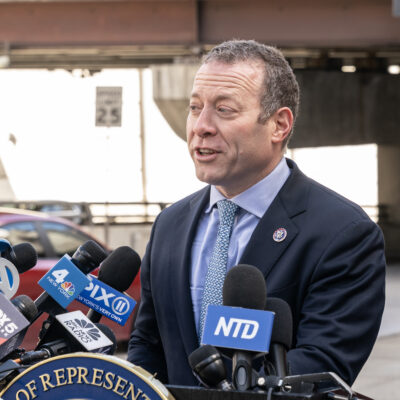Anti-Israel protesters threaten Stanford students attending forum for combating antisemitism
The university declined to say whether any punitive action was taken against the harassers

Tayfun Coskun/Anadolu via Getty Images
Stanford doctors, nurses and medical students protest against Israeli attacks on Gaza, near the Stanford University School of Medicine in Stanford, California, United States on November 20, 2023.
“We’re going to find out where you live.”
“Zionist, Zionist, you can’t hide.”
“Go back to Brooklyn.”
“Our next generation will ensure Israel falls, and America too, the other terrorists.”
Those were some of the antisemitic slogans hurled at Ari Arias and other Jewish students at Stanford University last Wednesday night outside an on-campus forum — meant to combat antisemitism.
“We were trying to leave the event and the entrance and exit were both packed with them yelling that we can’t hide,” Arias, a premed student in his junior year, told Jewish Insider. “As we finally exited the venue, they continued following us… They started yelling super-threatening things at us, like, ‘We know your names, we know where you work and soon we’re going to find out where you live.’”
The forum was organized by Kevin Feigelis, a doctoral student in the physics department. Speakers included the Stanford President Richard Saller, Provost Jenny Martinez and Michal Cotler-Wunsh, Israel’s special envoy for combating antisemitism.
Dee Mostofi, a university spokesperson, told JI that the school is “aware of the protest that took place on Wednesday outside an event to discuss antisemitism attended by Stanford leadership.” It is not clear whether the protesters were university students.
“While we respect the right to peaceful protest, hateful language such as ‘Go back to Brooklyn,’ which is a personal attack based on identity and stereotypes, is beneath all of us, and it harms the ability to have the reasoned exchange of ideas and debate that is central to the university. Stanford remains focused on supporting civil discourse and the well-being of all members of our community,” Mostofi said.
Asked whether the threatening statements violate Stanford’s speech policies and if punitive actions were taken, Mostofi did not respond.
Feigelis said that the anti-Israel “mob” on campus Wednesday night is part of a larger pattern seen on Stanford’s campus since Oct. 7, where on any given day it’s common to see protesters “chanting for Israel’s intifada.” The group has also organized a sit-in, where students have camped out since October demanding that the university endorse a cease-fire in Gaza and commit to the Boycott, Divestment and Sanctions movement against Israel, among other orders. Saller and Martinez met with students involved in the sit-in in December but have not commented on whether they plan to address the demands.
The pro-Palestinian rallies are so common that David Schuller, an applied physics doctoral student, has set out to observe and document as many of them as possible — with an Israeli flag in tow. Most of the time he’s standing alone.
“I actually interacted with the same group twice on Wednesday,” he told JI, explaining that while Wednesday night’s turnout outside of the antisemitism forum was notably large, the group also swarmed the outside of the engineering building that afternoon.
Later that day, Schuller, wearing a kippah, can be seen surrounded by pro-Palestinians chanting “resistance is justified when people are occupied,” in a video that has since gone viral. “Rape is not resistance,” Schuller repeatedly responded in the video.
“My intentions of going are to show them that we aren’t going anywhere… even though I’m a single person and they are at least 25 or 30 people,” he said, estimating that he’s been to 10 pro-Palestinian rallies since Oct. 7. None have turned physically violent, but sometimes threats are made if he doesn’t immediately leave, Schuller said.
“I often offer to sit down and have a conversation, but they respond that they won’t talk to me. There’s no room for nuance when they are shouting genocidal slogans. I know that there is a silent majority that does think these protests are ridiculous, even though I go alone and am portrayed as an extremist… in reality I care more about the Palestinian people than a lot of these protesters do,” he continued.
Arias, who describes himself as an active Jewish leader, said that he was afraid to walk around campus on Thursday. But he expressed the belief that “the president and provost have done a good job handling antisemitism relative to other schools.”
He pointed to the school’s Dec. 8 statement that said “Stanford unequivocally condemns calls for the genocide of Jews or any peoples.” The statement came several days after the presidents of Harvard, University of Pennsylvania and MIT testified on Capitol Hill and refused to say that calls for genocide against Jews would violate university policy. “I don’t think what happened on Wednesday has to do with the administration,” Arias continued.
Feigelis, meanwhile, called Stanford leadership’s words “empty.”
“There’s been such a lack of clear communication between the administration and students since [Oct. 7],” he said.










